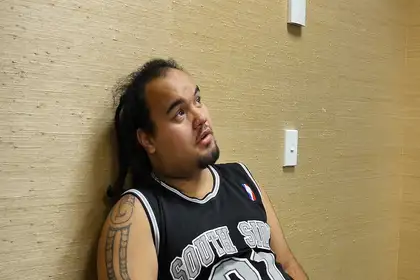
Bruce, seen rehearsing his story at Massey University in preparation for the public library event, is one of a dozen homeless people participating in the project.
Massey University students have used one of their courses of study to help tell the story of Wellington’s homeless.
Working with Wellington Compassion Soup Kitchen, more than 20 students studying the creativity in the community paper have teamed up to promote the Te Hā Tangata, the Human Library on Homelessness.
Rather than tell the story of the homeless themselves, the students and soup kitchen supporters, have invited people sleeping rough or in emergency night shelters to be actively involved in communicating their experiences personally.
Every Wednesday since the start of Semester I, people affected by homelessness have been coming to the Wellington campus to talk with the students about their experiences. and have their stories documented.
Course coordinator Associate Professor Elspeth Tilley says the discussion will culminate with an event at Wellington Public Library on Saturday May 27 when the public will be invited to meet and speak with people who are living with housing deprivation and well as hear their stories via audio and video.
The initiative is supported with funding from the New Zealand National Commission for the United Nations Educational, Scientific and Cultural Organisation. For Massey University, it follows previous community partnership projects carried out in the creativity in the community course that have included a focus on sexual consent and another about youth justice.
Student Jack Hitchens, who is studying the course as part of the Bachelor of Communication programme, says it has been motivating to engage with a real-world issue. “I think it's really great that universities can work alongside councils and organisations to tackle problems that a city as a whole is impacted by and actually have the ability to make change, not just being a theoretical scenario.”
International student Jordy Shinbane, from the United States of America, describes the process of meeting with the homeless who they describe as taonga or human books who the public can learn from about their challenges and vulnerabilities.
“We meet with our taonga weekly in our classroom at Massey University. We engage in theatre games, storytelling activities, conversations about what it takes to create a safe space, and ultimately listen to their personal stories and experiences. We bond with them and care about them.
“After those few hours we leave the classroom and continue on with our day. The moment I saw one of our Taonga sleeping on the street out in Wellington completely changed this project for me. I didn't see them as a random person lying on the street, but rather I saw them for the stories they have shared with us and for the times that were spent in our classroom. It makes you think twice about how you see someone at first glance; people are more than what they appear and their stories impact who and where they are.”
Class member Alice Guerin has also been deeply moved by the humanising effect of working side by side with those affected by housing deprivation. “It has been an eye opener to the fact that these people are people, they have feelings and emotions just like all of us. It is so important to remember that there are so many different ways people find themselves homeless and we need to support everyone in society with a community effort to make sure every person has a roof to live under.”
Another student, Charles Lee, says, “Legislation and government can only do so much in regards to this issue, so it's important to make an impact on a social and community level”.